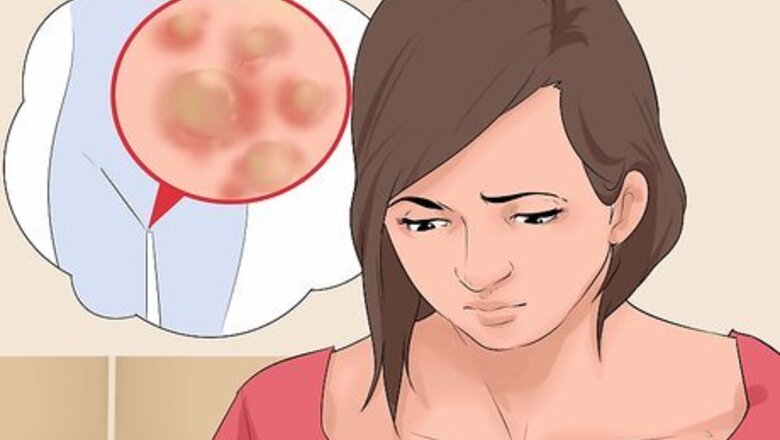
views
X
Trustworthy Source
Mayo Clinic
Educational website from one of the world's leading hospitals
Go to source
Studies show that genital warts may go away and come back, but you might be able to minimize the risk of future outbreaks.[2]
X
Trustworthy Source
MedlinePlus
Collection of medical information sourced from the US National Library of Medicine
Go to source
Work with your doctor to find the best treatment plan for you.
- Talk to your doctor if you notice signs of genital warts, such as flesh-colored lesions around your genitals, itchiness, or discomfort.
- Apply a prescription ointment on the warts or lesions, get them removed with surgery, or leave them be to heal without treatment.
- Prevent genital warts from coming back by getting tested regularly, using condoms, and getting vaccinated for HPV.
Getting a Medical Diagnosis
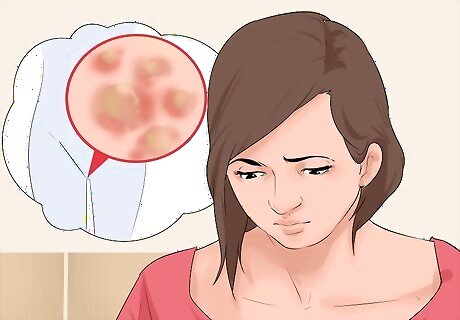
Recognize the symptoms and signs of genital warts. Although genital warts often show few or no symptoms, it's important to identify any symptoms you may exhibit. Consult your doctor for a definitive diagnosis if you notice any signs of genital warts, especially if you've engaged in unprotected sex. Both men and women can contract genital warts, and repeat outbreaks are common because HPV can remain in your system. Genital warts often present few symptoms and even when signs are present, they may be mild and cause no discomfort. In women, genital warts can appear on the vulva, the perineum, the anal canal, and on the cervix. They can also appear on the mouth, tongue, lips, or throat of a person who engaged in oral sex with an infected person. Common symptoms of genital warts in women are: small, flesh or grey colored lesions in your genital area; lesions clustered together that resemble cauliflower; itching or other discomfort in your genital area; and bleeding during intercourse. The warts or lesions may not be visible to the naked eye.
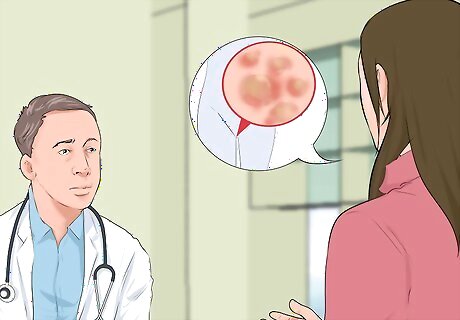
Consult your doctor. If you notice any signs of genital warts, including lesions on your genitals, or a partner has revealed they have genital warts, see your doctor. She will run tests and confirm a diagnosis and develop the best treatment plan for you. Tell your doctor about the symptoms you're experiencing, signs of genital warts that you've seen, and if you've had unprotected sex. If you're experiencing a recurrence of genital warts, contact your doctor to see if medication is necessary.
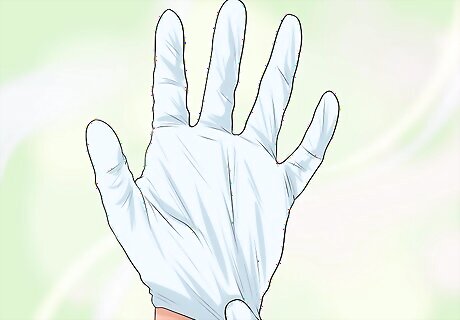
Undergo medical examinations. If your doctor suspects that you have genital warts, she may order medical tests. These simple screenings will help definitively diagnose the sexually transmitted disease and make it easier to develop the best treatment plan for you. Your doctor may apply a mild acetic acid solution to the suspect areas to see if they whiten any potential warts. After this, she may view the area with a magnifying instrument called a colposcope. Your doctor may give you a Pap test to detect changes in your vagina or cervix from warts or the HPV virus, which causes genital warts. If you are over the age of 30, your doctor may do a test to see if you have HPV in your system, which can help her diagnose genital warts. In some cases, your doctor may biopsy suspect spots, especially if they are atypical or the diagnosis is uncertain.
Treating Genital Warts
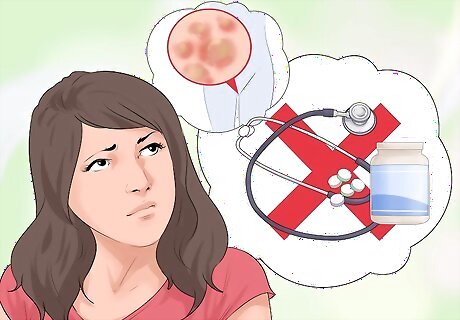
Leave your genital warts to heal without treatment. Genital warts may disappear on their own without treatment. If your genital warts are not painful, consider leaving them to heal without treatment. About 30% of genital warts will regress (go away) within the first 4 months after infection, even without treatment. If you decide to not treat your warts, you can leave them to heal as long as they're not causing you any discomfort. Be aware that even if you decide to leave the warts to heal on their own, that you can still infect others with warts and are more likely to get other diseases. If you choose to not treat your genital warts, they are also more likely to recur. They may also be hard to keep clean. HPV can cause cancer, including cancer of the vulva, vagina, penis, or anus. Because of this, it's a good idea to have a doctor monitor your condition.
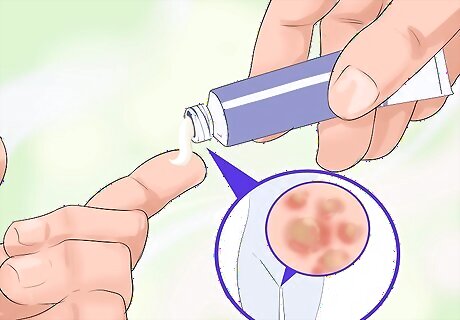
Get medical treatment for genital warts. If your doctor diagnoses you with genital warts, she will likely prescribe you a treatment that you apply directly to your skin. It's important to use a prescribed medication for genital warts and not an over-the-counter remedy. Your doctor may prescribe imiquimod, podophyllin, or podofilox or to treat the lesion. A prescription ointment using sinecatechins (green tea extract) may be prescribed for external and anal warts. You apply these treatments to the affected areas as prescribed by your doctor. Be aware that these treatments can cause skin sensitivity and weaken condoms or diaphragms. Your doctor may also apply trichloroacetic acid (TCA) to your genital warts. This treatment requires frequent visits to your doctor. Your sexual partner(s) also require treatment if they have symptoms of genital warts. This will keep you and your partner(s) from passing the disease back and forth between one another. Do not use over-the-counter wart treatments on genital warts. These medications aren't intended for delicate genital tissues and can increase any discomfort you have.
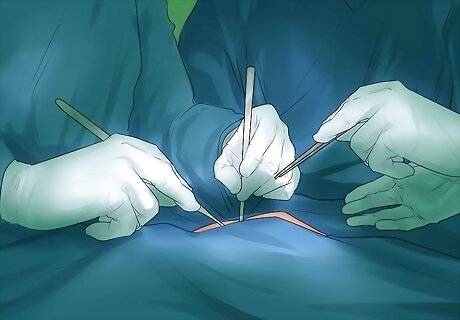
Undergo surgery to treat genital warts. In some cases, you may need surgery to remove large warts or warts that don't respond to medication. There are several different surgical procedures your doctor may perform if she needs to remove your warts. Cryotherapy, or freezing therapy, uses liquid nitrogen to freeze the area around a wart. The skin then forms a blister that sloughs off the wart. You may require several rounds of cryotherapy to remove genital warts. Electrocautery uses an electrical current to burn off warts. Surgical excision removes an entire area of suspect skin or a cluster of genital warts. Laser treatments are often a final measure for difficult to treat or extensive warts. All of the surgical treatments can cause pain, swelling, and scarring.
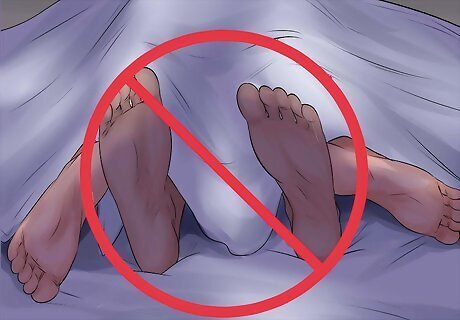
Avoid sexual activity or practice safe sex. During the course of your treatment for genital warts, abstain from sexual activity if you can, including oral and anal sex. If you cannot refrain from sex, use a latex or polyurethane condom. This may help from spreading the disease to your partner and decrease your risk of reinfection. If you have lesions, sex may cause discomfort. Be aware that genital wart treatments can decrease the efficacy of condoms.
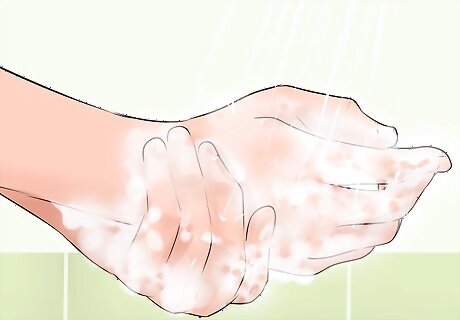
Prevent warts from spreading. One of the best ways to treat warts is to not get them, but this isn't always possible. There are several options to help you not spread your warts, from washing your hands to not picking at warts. Always wash your hands after applying treatments. Keep your genital area clean and dry, and change your underwear every day. Don't pick at your lesions, which may spread the warts and virus. Smoking cigarettes may cause recurrences of genital warts.
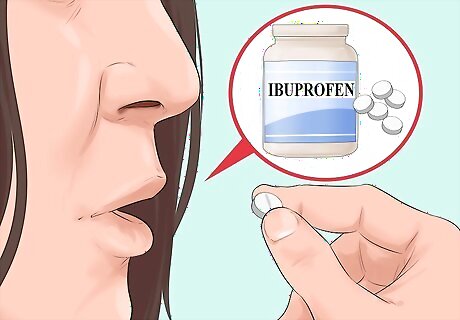
Relieve pain and discomfort caused by warts. In some cases, genital warts may cause pain and discomfort. You can help relieve the pain by applying compresses or taking an over-the-counter pain reliever. Use a cold compress for 1-2 hours daily to help relieve the discomfort of lesions. Take over-the-counter pain relievers such as ibuprofen or acetaminophen.
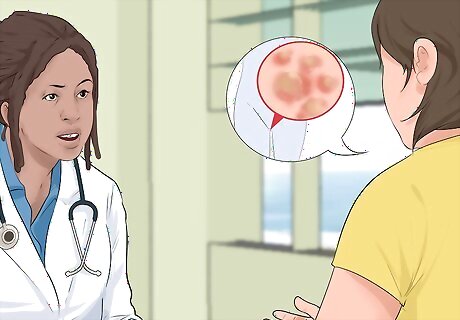
See doctor if your symptoms persist after treatment. If your symptoms of genital warts continue after treatment, see your doctor. Managing and treating these symptoms and the disease will help ensure that you don't have a recurrence or contract a more serious condition or complication.
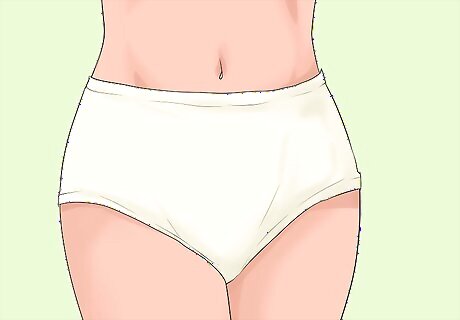
Wear clean, loose, natural fiber underwear. Wearing underwear that won't irritate your warts or the surrounding skin may help ease any discomfort you have from the condition. Choose loose, natural fibers such and be sure to change your underwear every day. Wearing cotton underwear may be a wise choice because it won't irritate your wart and will help absorb extra moisture from your skin.
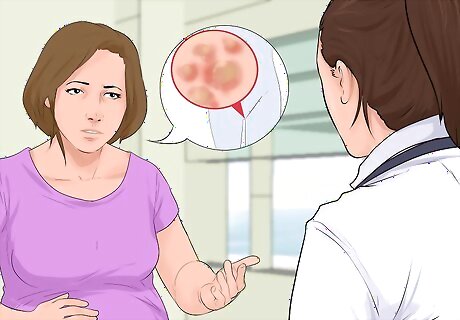
Stay in touch with your OB/GYN if you are pregnant and have genital warts. In general, genital warts do not pose a risk to you or your baby while you are pregnant. Because of the increased hormone levels in your body, you may see your genital warts become worse during pregnancy. If they cause you pain or discomfort, talk to your OB/GYN about ways to treat them. Although genital warts do not affect fertility or the ability to have a safe pregnancy, not treating the disease during pregnancy can cause complications such as bleeding or an inability of vaginal tissues to properly stretch. Not treating the disease may also mean you need to have a cesarean delivery (c-section). Pregnant women should usually not use topical treatments unless they are applied by your physician. TCA and cryotherapy are usually effective and safe for pregnant patients.
Preventing Recurrences of Genital Warts
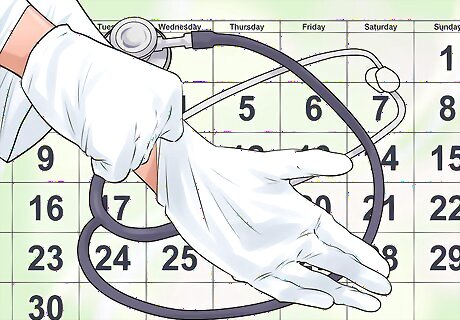
Get tested regularly for warts and HPV. If a doctor treated you for genital warts, get retested at regular intervals for them and for HPV. This will help ensure that the virus and disease have left your system and that you are no longer contagious. Recurrence of genital warts is common and is often treated with the same course of medications.
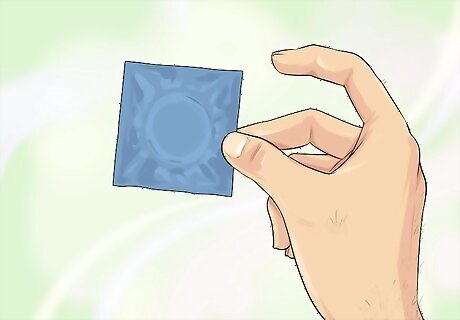
Practice safe sex. The best way to treat genital warts is to avoid getting them. Using latex or polyurethane condoms and limiting the number of your sex partners will minimize your risk for contracting the disease or having a recurrence. Always use condoms during sexual contact. Although condoms will not eliminate your risk of getting warts, they will decrease your risk. If you have oral sex, use a condom or dental dam. The more sexual partners you have, the higher your risk of getting genital warts is. Try and limit the number of partners you have to decrease your risk, and always use condoms with your partners.
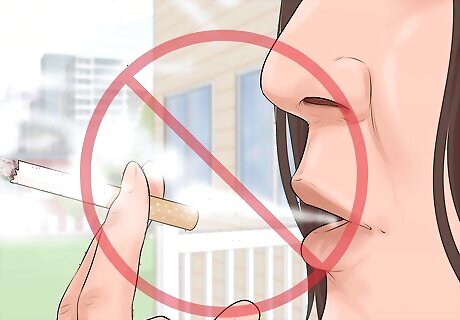
Be aware that smoking can increase your risk for genital warts. Doctors are not sure why, but being a smoker may make you more likely to contract genital warts. This may be because smoking suppresses your immune system. Being a smoker can also increase your likelihood of a recurrence. Try and avoid smoking for your overall health if possible.
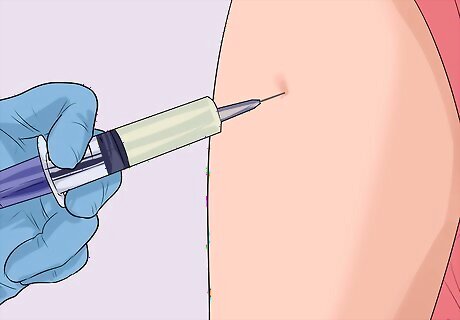
Get vaccinated for HPV. There is now a vaccine available that can protect against the strains of HPV which cause genital warts. If you or your child is between the ages of 9 and 26, consider getting the Gardasil vaccination to help avoid contracting genital warts. Be aware that Cervarix, which also protects against HPV, does not protect against genital warts. Getting the vaccination may reduce your risk of getting genital warts by 50%.




















Comments
0 comment